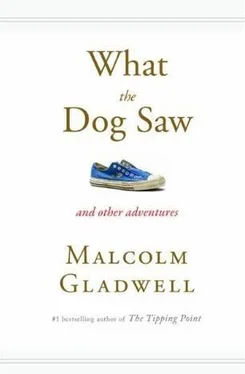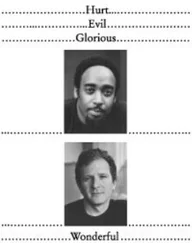Malcolm Gladwell - What the Dog Saw
Здесь есть возможность читать онлайн «Malcolm Gladwell - What the Dog Saw» весь текст электронной книги совершенно бесплатно (целиком полную версию без сокращений). В некоторых случаях можно слушать аудио, скачать через торрент в формате fb2 и присутствует краткое содержание. Город: New York, Год выпуска: 2009, ISBN: 2009, Издательство: Little, Brown and Company, Жанр: Психология, на английском языке. Описание произведения, (предисловие) а так же отзывы посетителей доступны на портале библиотеки ЛибКат.
- Название:What the Dog Saw
- Автор:
- Издательство:Little, Brown and Company
- Жанр:
- Год:2009
- Город:New York
- ISBN:978-0316075848
- Рейтинг книги:5 / 5. Голосов: 1
-
Избранное:Добавить в избранное
- Отзывы:
-
Ваша оценка:
- 100
- 1
- 2
- 3
- 4
- 5
What the Dog Saw: краткое содержание, описание и аннотация
Предлагаем к чтению аннотацию, описание, краткое содержание или предисловие (зависит от того, что написал сам автор книги «What the Dog Saw»). Если вы не нашли необходимую информацию о книге — напишите в комментариях, мы постараемся отыскать её.
What the Dog Saw — читать онлайн бесплатно полную книгу (весь текст) целиком
Ниже представлен текст книги, разбитый по страницам. Система сохранения места последней прочитанной страницы, позволяет с удобством читать онлайн бесплатно книгу «What the Dog Saw», без необходимости каждый раз заново искать на чём Вы остановились. Поставьте закладку, и сможете в любой момент перейти на страницу, на которой закончили чтение.
Интервал:
Закладка:
“Pallop, did you introspect?” Taleb calls out as he wanders back in from lunch. Pallop is asked what his PhD is about. “Pretty much this,” he says, waving a languid hand around the room.
“It looks like we will have to write it for him,” Taleb chimes in, “because Pollop is very lazy.”
What Empirica has done is to invert the traditional psychology of investing. You and I, if we invest conventionally in the market, have a fairly large chance of making a small amount of money in a given day from dividends or interest or the general upward trend of the market. We have almost no chance of making a large amount of money in one day, and there is a very small, but real, possibility that if the market collapses we could blow up. We accept that distribution of risks because, for fundamental reasons, it feels right. In the book that Pallop was reading by Kahneman and Tversky, for example, there is a description of a simple experiment, where a group of people were told to imagine that they had $300. They were then given a choice between (a) receiving another $100 or (b) tossing a coin, where if they won they got $200 and if they lost they got nothing. Most of us, it turns out, prefer (a) to (b). But then Kahneman and Tversky did a second experiment. They told people to imagine that they had $500 and then asked them if they would rather (c) give up $100 or (d) toss a coin and pay $200 if they lost and nothing at all if they won. Most of us now prefer (d) to (c). What is interesting about those four choices is that, from a probabilistic standpoint, they are identical. Nonetheless, we have strong preferences among them. Why? Because we’re more willing to gamble when it comes to losses, but are risk averse when it comes to our gains. That’s why we like small daily winnings in the stock market, even if that requires that we risk losing everything in a crash.
At Empirica, by contrast, every day brings a small but real possibility that they’ll make a huge amount of money in a day; no chance that they’ll blow up; and a very large possibility that they’ll lose a small amount of money. All those dollar, and fifty-cent, and nickel options that Empirica has accumulated, few of which will ever be used, soon begin to add up. By looking at a particular column on the computer screens showing Empirica’s positions, anyone at the firm can tell you precisely how much money Empirica has lost or made so far that day. At 11:30 a.m., for instance, they had recovered just 28 percent of the money they had spent that day on options. By 12:30, they had recovered 40 percent, meaning that the day was not yet half over and Empirica was already in the red to the tune of several hundred thousand dollars. The day before that, it had made back 85 percent of its money; the day before that, 48 percent; the day before that, 65 percent; and the day before that also 65 percent; and, in fact, with a few notable exceptions—like the few days when the market reopened after September 11—Empirica has done nothing but lose money since last April. “We cannot blow up, we can only bleed to death,” Taleb says, and bleeding to death, absorbing the pain of steady losses, is precisely what human beings are hardwired to avoid. “Say you’ve got a guy who is long on Russian bonds,” Savery says. “He’s making money every day. One day, lightning strikes and he loses five times what he made. Still, on three hundred and sixty-four out of three hundred and sixty-five days he was very happily making money. It’s much harder to be the other guy, the guy losing money three hundred and sixty-four days out of three hundred and sixty-five, because you start questioning yourself. Am I ever going to make it back? Am I really right? What if it takes ten years? Will I even be sane ten years from now?” What the normal trader gets from his daily winnings is feedback, the pleasing illusion of progress. At Empirica, there is no feedback. “It’s like you’re playing the piano for ten years and you still can’t play ‘Chopsticks,’” Spitznagel say, “and the only thing you have to keep you going is the belief that one day you’ll wake up and play like Rachmaninoff.” Was it easy knowing that Niederhoffer—who represented everything they thought was wrong—was out there getting rich while they were bleeding away? Of course it wasn’t. If you watched Taleb closely that day, you could see the little ways in which the steady drip of losses takes a toll. He glanced a bit too much at the Bloomberg. He leaned forward a bit too often to see the daily loss count. He succumbs to an array of superstitious tics. If the going is good, he parks in the same space every day; he turned against Mahler because he associates Mahler with the last year’s long dry spell. “Nassim says all the time that he needs me there, and I believe him,” Spitznagel says. He is there to remind Taleb that there is a point to waiting, to help Taleb resist the very human impulse to abandon everything and stanch the pain of losing. “Mark is my cop,” Taleb says. So is Pallop: he is there to remind Taleb that Empirica has the intellectual edge.
“The key is not having the ideas but having the recipe to deal with your ideas,” Taleb says. “We don’t need moralizing. We need a set of tricks.” His trick is a protocol that stipulates precisely what has to be done in every situation. “We built the protocol, and the reason we did was to tell the guys, Don’t listen to me, listen to the protocol. Now, I have the right to change the protocol, but there is a protocol to changing the protocol. We have to be hard on ourselves to do what we do. The bias we see in Niederhoffer we see in ourselves.” At the quant dinner, Taleb devoured his roll, and as the busboy came around with more rolls Taleb shouted out, “No, no!” and blocked his plate. It was a never-ending struggle, this battle between head and heart. When the waiter came around with wine, he hastily covered the glass with his hand. When the time came to order, he asked for steak frites—“without the frites, please!”—and then immediately tried to hedge his choice by negotiating with the person next to him for a fraction of his frites.
The psychologist Walter Mischel has done a series of experiments where he puts a young child in a room and places two cookies in front of him, one small and one large. The child is told that if he wants the small cookie he need only ring a bell and the experimenter will come back into the room and give it to him. If he wants the better treat, though, he has to wait until the experimenter returns on his own, which might be anytime in the next twenty minutes. Mischel has videotapes of six-year-olds sitting in the room by themselves, staring at the cookies, trying to persuade themselves to wait. One girl starts to sing to herself. She whispers what seems to be the instructions—that she can have the big cookie if she can only wait. She closes her eyes. Then she turns her back on the cookies. Another little boy swings his legs violently back and forth, and then picks up the bell and examines it, trying to do anything but think about the cookie he could get by ringing it. The tapes document the beginnings of discipline and self-control—the techniques we learn to keep our impulses in check—and to watch all the children desperately distracting themselves is to experience the shock of recognition: that’s Nassim Taleb!
There is something else as well that helps to explain Taleb’s resolve—more than the tics and the systems and the self-denying ordinances. It happened a year or so before he went to see Niederhoffer. Taleb had been working as a trader at the Chicago Mercantile Exchange, and he’d developed a persistently hoarse throat. At first, he thought nothing of it: a hoarse throat was an occupational hazard of spending every day in the pit. Finally, when he moved back to New York, he went to see a doctor, in one of those Upper East Side prewar buildings with a glamorous facade. Taleb sat in the office, staring out at the plain brick of the courtyard, reading the medical diplomas on the wall over and over, waiting and waiting for the verdict. The doctor returned and spoke in a low, grave voice: “I got the pathology report. It’s not as bad as it sounds.” But, of course, it was: he had throat cancer. Taleb’s mind shut down. He left the office. It was raining outside. He walked and walked and ended up at a medical library. There he read frantically about his disease, the rainwater forming a puddle under his feet. It made no sense. Throat cancer was the disease of someone who has spent a lifetime smoking heavily. But Taleb was young, and he barely smoked at all. His risk of getting throat cancer was something like one in a hundred thousand, almost unimaginably small. He was a black swan! The cancer is now beaten, but the memory of it is also Taleb’s secret, because once you have been a black swan—not just seen one but lived and faced death as one—it becomes easier to imagine another on the horizon.
Читать дальшеИнтервал:
Закладка:
Похожие книги на «What the Dog Saw»
Представляем Вашему вниманию похожие книги на «What the Dog Saw» списком для выбора. Мы отобрали схожую по названию и смыслу литературу в надежде предоставить читателям больше вариантов отыскать новые, интересные, ещё непрочитанные произведения.
Обсуждение, отзывы о книге «What the Dog Saw» и просто собственные мнения читателей. Оставьте ваши комментарии, напишите, что Вы думаете о произведении, его смысле или главных героях. Укажите что конкретно понравилось, а что нет, и почему Вы так считаете.











